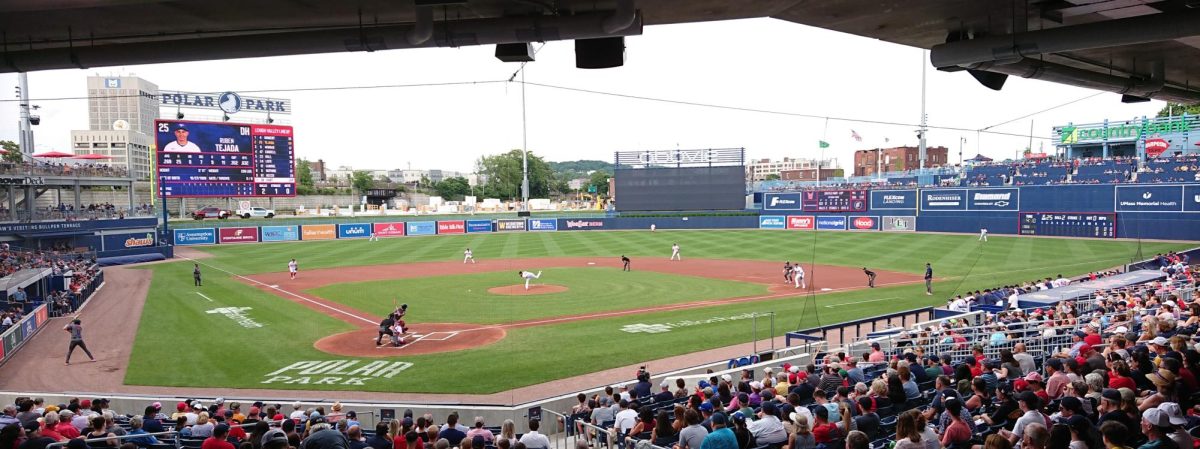Worcester’s City Council recently rejected a proposal to “delete” the city’s Ballpark Commission in an 8-1 vote. Councilor Khrystian King was the only dissenting vote. The Ballpark Commission’s responsibilities include managing many financial aspects of Polar Park, including hosting up to 8 revenue-generating events per year, and managing the lease of the stadium to the Worcester Red Sox. The commission is also responsible for working with the city manager (an unelected official appointed by the mayor who does much of the day-to-day running of the city) to promote and develop rules for the stadium. This public body was created in April of 2021. If the commission was dissolved, its powers would fall to the city’s Department of Public Facilities.
The members of the Ballpark Commission are appointed by and accountable to city manager Eric Batista. In July, Batista made a proposal to delete the commission. He claimed in his proposal that it has largely been an ineffective body and does not have the powers to execute the duties they are appointed to. This claim is validated by the actions – or lack thereof – of the commission. Each year the commission is encouraged to host up to 8 revenue generating events, from which the city would pocket proceeds. The Ballpark Commission has never arranged one of these days in the nearly three years the commission has existed.
Additionally, the commission has only met 8 times since 2022, and none of these meetings have recordings or transcripts available online. Worcester city government generally has a transparency problem, and this commission is no different.
City officials have stated that the stadium has cost $157 million, making it the most expensive minor league ballpark ever built, according to research by the Worcester Business Journal. Additionally, the city continues to invest heavily in the neighborhood surrounding the ballpark, the Canal District. How has the city recouped this investment? A recent study by Dr. Robert Baumann, an economics professor at the College of the Holy Cross, shows that the stadium has underperformed financially for the businesses around it, and clearly is not bringing in the amount of revenue the city expected it to with the missing revenue generating days.
Do not confuse this article for a call saying Worcester is not neoliberal enough – far from it. If Worcester wants to spend money for public benefit with no expectation for return, that would be wonderful. Polar Park, however, does not accomplish this. It is a monument to an ideology bent on economic growth and “revamping” the image of the city. The structures urban planners in this city have erected for decades are deeply neoliberal, and the ballpark commission is a manifestation of this.
For better or worse, we built this stadium. Now we need to administer it correctly. From all accounts, the ballpark commission is not doing a great job of this administration.
This leads to a clear question: why has the ballpark commission been so ineffective? Cities across the nation would love to have such a grandiose municipal asset as Polar Park, why haven’t we been able to utilize this piece of public infrastructure to its truest potential? There are two potential answers to this question: either the Ballpark Commission does not have the political will (as happens with far too many political bodies here in Worcester) or the political powers to do what they are designed to do. At the very least, this body is clearly in deep need of reform, if not abolition.
This makes the decision to keep the barely functioning Ballpark Commission deeply confusing. Although there was not a clear path for the Department of Public Facilities to take over the limited functions the Ballpark Commission completes, I do not doubt that they could muster the capacity to complete these additional tasks. Frankly, the ballpark commission didn’t do much and what they did do they were not very good at. This argument – which most who voted against the proposal followed – doesn’t hold much water. City Manager Batista himself made this argument in an October 10 City Council meeting, stating, “we’re still having discussions internally in terms of what options there are for council to review if this commission were to be denied.” Bautista made the motion to delete the commission back in July, just for him to argue to keep it now in October.
What this odd reversal shows is not that we here in Worcester are unable to manage a ballpark – this may be true – but just as with Worcester Union Station, it illuminates deep systemic issues in Worcester politics. We have a municipal government either unwilling or unable to utilize the city’s extensive resources. We must grasp the reins of this great city and bring it into a true renaissance; if you are a Worcester resident, please vote November 7 in the municipal elections.


